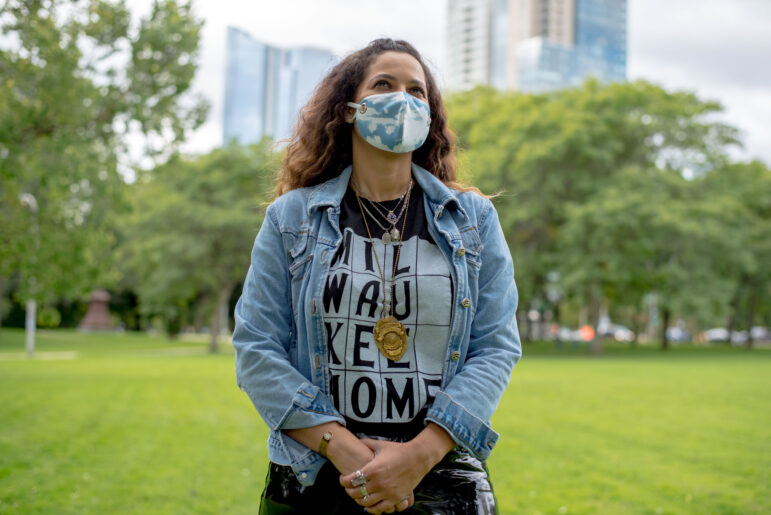

This piece was produced for the NEW News Lab, a local news collaboration in Northeast Wisconsin.
In 2017, Milwaukee County Executive Chris Abele appointed Nicole Brookshire to lead the county’s Office on African American Affairs (OAAA). At OAAA, Brookshire would join a movement to acknowledge racism and oppression through concrete policy change. In 2019, with Brookshire and others at the helm, Milwaukee County became one of the first jurisdictions in the nation to declare racism a public health crisis. Since then, more than 170 jurisdictions across the country have followed suit.
Now, joining that list of jurisdictions is Brown County. In February, the County Board adopted an official declaration that racism is a public health crisis, which also established the Racial Equity Ad Hoc Committee. Last month, that committee convened for the first time. The declaration came after a tumultuous summer of protest swept the nation. Now, Brown County is looking to bring real change to its communities by modeling its work after similar declarations made in places like Milwaukee.
In 2019, Milwaukee set out to achieve a simple goal: to make Milwaukee the healthiest county in the state. To make that happen, the county began pursuing three strategic focus areas to address racial inequality and extreme health and economic disparities. Those focus points include creating intentional inclusion, bridging the gaps in health care and other silos throughout the county, investing in equity.
The initial declaration in Wisconsin that racism is a public health crisis came from outside the government: the nonprofit Wisconsin Public Health Association (WPHA) made that declaration in May 2018. Former Director-at-Large Lilliann Paine pushed that declaration through, which eventually made a path for both Milwaukee County and the city of Milwaukee to do the same in May 2019 and July 2019, respectively.
As a longtime student of public health and a Milwaukee native, Paine’s decision to tackle racism head-on was not an option.
“When you opt into public health you don’t get to opt out of leadership,” she said in an interview.

In Wisconsin, extreme racial disparities have caused negative health outcomes for many Black and brown communities. According to COWS 2019 Race in the Heartland report, Wisconsin is the fourth worst in the nation for both infant mortality and child poverty among Black residents. Wisconsin is also ranked worst in the nation for unemployment.
A 2019 study by 24/7 Wall St., a financial news and analysis company, ranked Milwaukee the worst place in the country for Black residents. In 2020, WalletHub, another finance website, found a 107% racial income gap between Black and white households in Wisconsin, Milwaukee Journal Sentinel reported. According to 24/7 Wall St. income is a significant determinant of health outcomes. In Milwaukee, 1,020 in every 100,000 Black residents die each year — 300 more deaths per 100,000 deaths among white residents, according to the report.
“I wanted to address those gaps in health outcomes,” said Paine, who is now the Director of Technical Assistance and Business Development at the National Birth Equity Collaborative. “Differences in ways we access health, quality of health, and where we work, live and play, and what that means for our life course, from the cradle to the grave.”
For the WPHA, the journey to equity began within. UBUNTU Research and Evaluation conducted a study on racial equity, policy and procedures within WPHA.
The study defines racism as a “permanent aspect of society.” UBUNTU’s Racial Equity Assessment Report explains that whiteness and racism impact organizations and the public that they serve.
Prior to joining WPHA, Paine served as a health and well-being educator for UW-Extension. It was through that work that she realized how targeting public health officials could effectively change the culture and standards of public health in Wisconsin.
“Those key players, those public health officials, could influence how another generation [is] brought up in those systems,” she said.
As one of the primary authors of the resolution, Paine drew inspiration from American Public Health Association’s past-President Dr. Camara Jones. Jones launched a National Campaign Against Racism in 2015, which set the stage for the wave of public declarations against racism that followed.
“We give credit to Dr. Camara Jones, as well as some other scholars, for the language that we put together,” Paine said.
The WPHA’s resolution defines the word “crisis” as a problem affecting a large number of people, threatening health over a long period of time and requiring large-scale solutions. Former Milwaukee Health Commissioner Dr. Jeanette Kowalik said choosing the word “crisis” was very important. For her, the word crisis speaks to the chronic nature of the problems at hand.

(Will Cioci / Wisconsin Watch)
“Racism is so embedded into our systems and practices and policies here in the United States. That’s why we [say] crisis,” said Kowalik, who worked with the WPHA and Milwaukee county to draft a city-wide resolution that declared racism as a public health crisis in July 2019.
“[These] declarations demonstrate the importance of not only acknowledging historical injustices, but also clearly defining steps towards dismantling structural harm,” Paine said.
Brookshire and Kowalik both acknowledged that growing demands for action against inequality and having WPHA’s resolution as template, created a lot of momentum for change in the Milwaukee area. Brookshire and her team were able to develop a racial equity training series for 3,000 plus staff and supported institutional change when designing the local racial equity ordinance. OAAA also offered guidance across the county on how to address race-related incidents of violence. And when the COVID-19 pandemic set in, OAAA focused on outreach to the community.

“We really shifted gears to go into community drive awareness and communication, and then lift up the needs that are aligned [with] COVID,” Brookshire said.
At the city level, Kowalik and former Deputy Commissioner Griselle Torres developed an anti-racism plan for Milwaikee’s health department. This work also created a path for an anti-racism approach to the former-commissioner’s pandemic response.
“The city created a mask ordinance in July of last year. And the mask ordinance was developed with equity in mind,” said Kowalik, who is now the Director of Policy Development at Trust for America’s Health in Washington D.C. “Like the police department isn’t even listed as an enforcer [on the ordinance], because there were issues with the state’s Safer at Home (order). The police were issuing more citations for people of color.”
The pandemic, combined with the racial justice protests of 2020, created a lane for accountability and progress unlike Wisconsin had seen before. For Kowalik, it also highlighted the need for relationship building between the community and government.
“The pandemic accelerated a lot of that repair and relationship building,” she said. “We were able to pivot or redirect funds to community organizations and small businesses in a reasonable timeframe for the government.”
However, none of the declarations that led to this action came without pushback. From disapproving emails from residents to troubles connecting with colleagues over the severity of the issues at hand, tackling racism head-on through public declaration and accountability was no small task.
“It’s a heavy lift,” said Brookshire, who is now CEO of Brookshire Customized Solutions. “You have to look at the data. You have to [uplift] the voice of people. And you have to drive accountability by shaping who makes those decisions and who continues to be invited to the table.”
For those working on the Racial Equity Ad Hoc committee in Brown County, Brookshire has a word of advice: “Go big or go home.”



